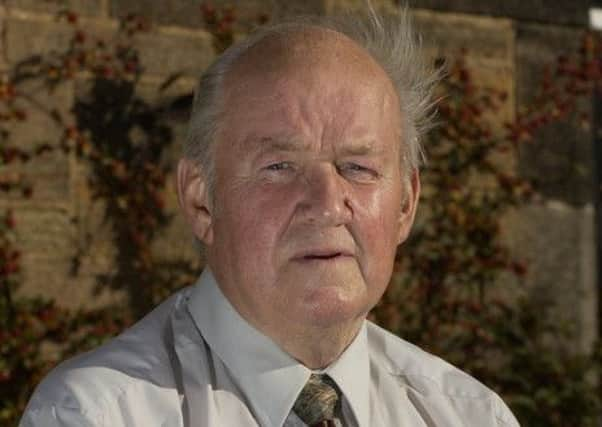Obituary: Donald Macaulay, QC and politician


Donald Macaulay was a distinguished member of the Scottish legal profession and recognised as one of the most compelling advocates at the Scottish Bar. He was involved in many high-profile cases and had a keen interest in politics – acting as the spokesman in the House of Lords on Scottish legal affairs for the Labour Party.
Lord Abernethy was a colleague of Macaulay for many years and recalls him with a special pleasure. “Donald was much liked and respected as an individual and as a lawyer. He was thoroughly trustworthy and honest, and had an outstanding ability to present the facts of a case to the jury. He was lucid and avoided, where possible, complicated legal terms. Donald was down-to-earth and had a great faith in humanity.”
Advertisement
Hide AdAdvertisement
Hide AdDonald Macaulay was the youngest of seven children and his father worked in the Singer sewing factory in Clydebank. His family originated from the Isle of Lewis but they moved to Clydebank in the late 1920s. Their house was bombed during the Second World War blitz and Macaulay was evacuated to first Lenzie then Helensburgh.
He attended Clydebank High School and read law at Glasgow University. On graduating, he worked in Glasgow and then joined a family practice in Falkirk. In the late 1950s, he decided to read for the Bar and became an advocate in 1963 and a QC in 1975.
Macaulay had an agile mind and, when addressing the jury, could get to the heart of the intricacies of a case with a commanding precision. He played a prominent part in the notorious, and legally complex, “Glasgow Rape” case of 1982. The previous year, a woman alleged she had been raped and seriously injured in Glasgow. Three youths were charged and a case was eventually heard in the High Court in Edinburgh. Macaulay was part of the defence team led by Hugh Morton QC.
In 1985, Macaulay represented Robert Henderson on a charge of attempted murder at the High Court in Kirkcaldy. In a keenly argued defence, Macaulay pleaded before Lord McCluskey that as far as his client was concerned, there was “an absence of murderous intention”. Henderson was cleared.
Macaulay appeared in a court for a crime committed on a football playing field. This was so rare that one of Scotland’s senior Queen’s Counsel involved in just such a courtroom drama referred to it as a unique test case. Macaulay was appearing for his client, the former Rangers footballer Graham Roberts. It was 1988 and Roberts and fellow Ibrox stars Terry Butcher and Chris Woods were standing trial on breach of the peace charges during an Old Firm derby, at Glasgow Sheriff Court, alongside Celtic’s Frank McAvennie. “No football player in this country has had to face a charge of this nature,” Macaulay asserted in court.
“Footballers are not immune from the law, but the action complained of was totally within the field of play and not calculated against the crowd.”
Macaulay argued his case most effectively and the case against Roberts was found not proven.
Macaulay had a keen interest in maintaining and enhancing the reputation of the Scottish legal profession. He had been active in Labour politics for many years and sat on various legal committees.
Advertisement
Hide AdAdvertisement
Hide AdHe stood as the Labour candidate at the 1970 general election for Inverness, losing to the sitting MP Russell Johnston.
Macaulay was a member of the Bryden Committee (chaired by Sheriff Principal WJ Bryden in 1978) which considered the most reliable methods of identifying suspects.
He was appointed the spokesman on legal affairs in Scotland in the House of Lords and was involved in the preliminary matters concerning the trial in the Netherlands of the Lockerbie bombers. In 1993, he led a team of Scottish lawyers, including Professor Robert Black QC, to Tripoli for a meeting with the Libyan defence team.
In 2003, Macaulay underwent a liver operation at Edinburgh’s Royal Infirmary. The operation was successful and Macaulay devoted much time and energy to raising funds for the transplant unit at the hospital.
In 2004, Macaulay was asked by George Foulkes, then chairman of Heart of Midlothian, to chair an independent working party to find a new home for the club. Macaulay, a life-long Hearts supporter and a season ticket holder, said: “I am interested in the future of Hearts and to try and take them in the right direct and to take the board in the right direction. I want to see them continue in existence.”
But it was Macaulay’s outstanding ability as a practitioner in the criminal courts that marked him out as such an accomplished and prominent lawyer. He was always straight-forward and honest in all his dealings: those qualities, many suggested, made him one of the most effective prosecutors at the Bar. His cross-examination techniques were invariably courteous, civilised and informed.
Macaulay was made a life peer in 1989 and took the title of Baron Macaulay of Bragar in the County of Ross and Cromarty, in recognition of his family’s Hebridean origins.
He is survived by his wife Mary and their daughters Donna and Joanne.